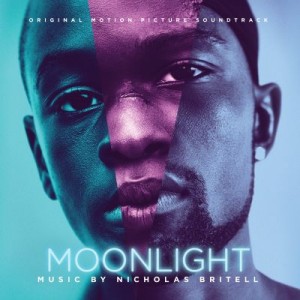
MOONLIGHT soundtrack| ©2016 Lakeshore Records
In a tough urban environment, being loud and proud is something reserved for the macho occupations of drug dealing and gangsterism, certainly not in the far more vulnerable act of proclaiming oneself as gay. It’s a contrast that marks both filmmaker Barry Jenkins’ artistically subtle approach to MOONLIGHT, and his composer Nicholas Britell’s classically ethereal score. As divided into three “chapters,” Jenkins paints the quiet coming of age of Chiron, the seemingly meek son of a crack addicted mother who falls under the foster fatherhood of the sympathetic dealer Juan (Mahershala Ali, currently impressing as the far more villainous crime kingpin Cottonmouth in Netflix’s LUKE CAGE). Just as important in Chiron’s bullied upbringing is his friendship with Kevin, whose advice in navigating violent 9 year-olds progresses into something far more as MOONLIGHT traces the youths to the age of 16, and then adulthood, where Chiron turns from victim to a man no one will mess with – his muscular remaking inspired by a life-shattering betrayal that must find peace with Kevin in the present.
It’s an evolution told in a powerfully quiet, almost dream-like way by Jenkins that deals firmly with the reality of the street, though not in a way that plays into the expected affirmation of orientation. Given a beautifully yearning piano theme for a boy whose few words always yield punishment, Britell tracks Chiron’s evolution with a classical lyricism that one might expect from a Terence Mallick film as opposed to BOYZ N THE HOOD, a refined, poignant style that’s a poetic match for Jenkins’ uniquely powerful storytelling. It’s a quivering tension and melodic stare up into an ethereal MOONLIGHT that marks an uncommonly beautiful and inventive score with more “street” roots than one might expect from music that hearkens to the white maestros of yore.
As a Julliard-trained musician, Britell has his own footing in both the classical and hip-hop worlds, performing as a keyboardist for The Witness Protection Program, whose rhythmic popularity saw the band open for the likes of Jurassic 5 and Blackalicious. Producing both the short and featuring versions of WHIPLASH, Britell applied his hip hop grooves to the acclaimed indie bombing dramedy GIMME THE LOOT in 2012, then to ironic rhythmic effect for THE BIG SHORT‘s groovy financial meltdown. Britell reached back to far more chilling urban roots in 2013 to arrange songs, and compose additional music for12 YEARS A SLAVE, then fully immerse himself in the struggle for liberation with 2016’s “Free State of Jones,” a restrained, rustic score that brought to light the unusual partnership between Confederate deserters and runaway slaves. Now with MOONLIGHT, Nicholas Britell continues his musical exploration of not only ethnic identity, but of hearing one’s true self for one of the year’s most poetically haunting scores, and films.
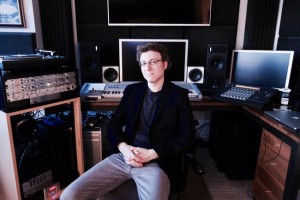
MOONLIGHT composer Nicholas Britell | ©2016 Nicholas Britell
ASSIGNMENT X: You started playing piano at a very young age. Could you tell us about your musical upbringing and how film scoring caught your ear?
NICHOLAS BRITELL: I started playing piano when I was five years old, and in fact, it was film music that first inspired me in music. When I was growing up, we had a very old upright piano in our apartment. After watching the film CHARIOTS OF FIRE I fell in love with the theme music for the film;. So I went to the piano and tried to figure it out on my own. I was so inspired by that music that I asked my parents for piano lessons. So truly, in a lot of ways, it was film music that got me started. I then pursued classical piano for a very long time. For a while, I considered being a full-time concert pianist. I went to Juilliard for their Pre-College program, and from there I continued pursuing music, joining a hip-hop band in college at Harvard and scoring films for the first time there as well.
AX: You produced both the original short of WHIPLASH as well as the feature film. How did you become involved with the project, and did you have any kind of Mr. Fletcher-like teachers who pushed you to your limit?
BRITELL: I had always been very fascinated with the way in which movies are actually made and produced. I have a very dear friend, Helen Estabrook, who was quite a few years ago in the process of putting together the film WHIPLASH. One day we were having a phone call and talking through the process of financing films, and she mentioned the idea of producing a short-film version of this fascinating screenplay written by Damien Chazelle, which was called WHIPLASH.
Damien had written a full-feature script, and they had this idea of creating a short film, which would be one scene from the feature’s script. By producing this short film, it could serve as a proof-of-concept for the feature film, which could get then financiers excited about the project and help fund a feature-film version of the movie. So because of my curiosity with that process and my belief in the script and the team, I agreed to come on board, and I actually financed the short-film version of WHIPLASH. I was then was able to stay on board to help, and I served as a co-producer on the feature as well. So that was an opportunity for me really to just explore another side of filmmaking outside of my passion for composing.
About the question of whether I ever had a Fletcher-like teacher, I think one of the elements of the script that really resonated with me was my own musical background obviously. I never had a teacher who was Fletcher-like. But I will say that I think some of my more intense musical learning experiences were the ones that pushed me the most, and in hindsight, it was the times when I was working the hardest, when I had potentially the most pressure on me, that I feel I did make great strides. So in some ways, I think the intense experiences did lead to musical growth.
AX: How did you become attracted to hip-hop, and how do you think that walking in both urban and classical musical worlds adds to your voice as a composer?
BRITELL: I was in junior high in the early 1990s, and 1993 was obviously a very big year in hip hop. Early on, I was really fascinated by the sound of hip-hop, and over the years, although I was pursuing a classical music path in college, I became very inspired by the idea of writing hip-hop music and beats. A group of friends and I started a hip-hop band in college, and we ended up performing quite a bit. We spent really almost the entire four years of college performing and pursuing it. We even ended up opening for Jurassic 5 and Blackalicious, and touring throughout the Northeast. We used to play a lot in New York at places like Arlene’s Grocery, Don Hill’s, CB’s, and Lion’s Den. In Boston, we performed at the Paradise, the Middle East, House of Blues, and others. We played many, many colleges throughout the Northeast, and I really immersed myself in hip-hop through those years. I had a very focused approach to writing music because of the band.
I think the habit of writing music so continuously as part of a band was a very formative experience for me in the sense that it paved the way for, I think, the sort of regular activity of composition, which I’ve pursued fully since then. It was through the band that I became very active as a composer, and it never felt like there was anything but a very natural interplay between my composing for films or classical music and the songwriting that I was doing for our band.
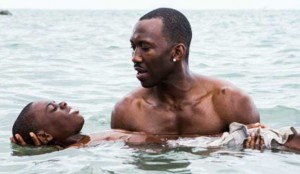
MOONLIGHT| ©2016 Plan B Entertainment
AX: Can you tell us about the “Chopped and Screwed” technique that can be heard in the Moonlight score?
BRITELL: “Chopped and Screwed” is a technique that first seems to have originated in the early 1990s. It’s a genre of Southern hip hop where songs are taken and slowed, and in the process of slowing them, the pitch bends lower, and so you get these tracks which are deepened and enriched in their musical texture, and so, a typical chop and screw might be take a song where you slow it and pitch it and then edit it by chopping it up in different ways, sort of remixing it in a sense.
When I was first working with Barry on MOONLIGHT, among our early conversations, Barry expressed his passion for Chopped and Screwed music, and immediately I was into that idea because I felt that there was this real exciting possibility of taking instrumental classical-oriented music and applying this technique to it. So in some ways, it was both my classical background and my hip-hop experience that came together in that moment, and then led me to sort of very quickly think of the possibilities of applying the Chop-and-Screw approach to a score.
AX: MOONLIGHT has a beautiful elegiac classical approach to the score. What was the process of developing the score with Barry, and how would you describe his musical vision?
BRITELL: The process of developing the score for MOONLIGHT for me really began first with my experience of reading the screenplay, and then followed by seeing some of the early cuts of the film. My first reaction to reading the screenplay was that it was incredibly poetic. It was intimate. It was sensitive. There was a tenderness to it. There was a deep beauty to it, and I was really, really overwhelmed by how powerful it was.
I think the first instincts that I had because of those feelings were that the music had to express and reflect some of that feeling of poetry. In my first conversations with Barry, and among the first ideas that I sent over to him, I actually called one of the early themes “Piano and Violin Poem.” That musical “Poem” was one of the early pieces where I was trying to evoke that feeling of poetry. I think that what evolved from that was a score that actually had many different characteristics. There were elements certainly of tenderness, of quietness, of soft atmospheres; but at the same time, there are moments in the score that get very large and almost soaring and operatic, and I think that one of the really wonderful things about the relationship that Barry and I had was that there was this huge scope of possibilities. Barry is deeply passionate about music and has a really, really wide knowledge of music; and I think because of that, he was very open to exploring a wide range of possibilities for the score.
Our collaborations really entailed a lot of discussion, a lot of experimenting to see what kind of music different scenes merited and what kind of music was needed. But we also kept our minds open as to the many different directions that the score could take. So it was definitely something that continued evolving as the film was edited, and over the time period that we were working, we continued to come up with ideas as the process evolved.
AX: There are cues, particularly “You Don’t Even Know,” that have the impression of an orchestra warming up, along with the rising cellos of “Don’t Look at Me.” What was your intention musically with those cues?
BRITELL: There definitely were elements of the score where I utilized the sounds of an orchestra tuning up or instruments getting ready to play. I’ve always found that to be a very beautiful sound because on the one hand, the instruments are tuning up so they’re not yet in their “fully-prepared” tuning, they’re not yet playing a piece, and there’s this sort of chaos involved in that. But because they’re musical instruments and because musicians have specific approaches to their instruments, there is also an order to the way that it happens, and I always love that sound of the combination of order and chaos. I think there’s something very evocative about sounds like that, so as regard to the development of Chiron’s journey in the film and certain of those scenes, it felt like that kind of a texture could play an interesting role within the score.
As far as the cellos in a cue like “Don’t Look at Me,” some of those interestingly are actually violins, which we Chopped and Screwed and bent so they sound more like cellos. The riff I think you’re referring to within the track “Don’t Look at Me” is linked with the violin concerto-like texture in the piece “The Middle of the World,” which plays in the swimming sequence early on, so there are definitely elements of continuity that we were trying to have over the course of the film as the story evolves.
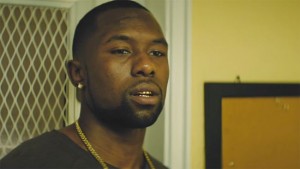
MOONLIGHT| ©2016 Plan B Entertainment
AX: The film reflects three ages that the characters go through. How did the music reflect that in relation to the character themes?
BRITELL: Following some of my previous thoughts on, for example, the violin-cello motif in the “The Middle of the World” track and the “Don’t Look at Me” track, there were absolutely thematic elements that I wanted to provide as a thread that could connect the different chapters. So certain themes do recur. For example, the track “Chiron’s Theme” melodically occurs in a few places in the film. It occurs in the very beginning, where we call it “Little’s Theme,” (that’s the piece which I had called “Piano and Violin Poem” when I first sent it to Barry), and that piece is really a contemplative piano and violin prelude of a piece, which serves, in a sense, of trying to get inside of Chiron’s point of view. It was trying to provide a sense of his internal emotional state, and that piece of music appears through the course of the three chapters. But in each chapter it is modulated into a different key. It’s orchestrated differently with varying instrumentation as it evolves, and it’s also Chopped and Screwed in certain places.
For example, “Little’s Theme” in chapter one becomes what we call “Chiron’s Theme” in chapter two where it’s pitched down and bent. It then also occurs in a very Chopped-and-Screwed manner in the schoolyard fight where it’s almost entirely in the subwoofers, and it’s pitched about three octaves down and played on top of itself. There’s almost a double version of it playing. Then, in chapter three, it comes back again, and there it’s actually an ensemble of cellos performing it, so I think one way that we did evolve things while also linking them was by having these types of recurring themes, which in each chapter would morph both in their sonic pitch range, the keys, but also in the instrumental textures and in the techniques we used to actually create those sounds.
AX: How did you want the score to contrast with the more rap, funk, soul tracks on the soundtrack?
BRITELL: I think that in a lot of ways, it’s a credit to Barry’s wide range of musical instincts that he was open, like I was saying before, to such a huge range of musical possibilities existing in the same film. And I think that one of the really fascinating things that we did was incorporating elements of the hip-hop texture into the score through the Chopped-and-Screwed technique. So while the score doesn’t actually perform any hip-hop tracks, there is this feeling of rumbling and power and depth that you might have in a really great hip-hop track, which we tried to evoke in the score’s soundscape.

THE BIG SHORT soundtrack| ©2016 Paramount Pictures
AX: Tell us about composing THE BIG SHORT.
BRITELL: THE BIG SHORT was an amazing experience. Working with Adam McKay and editor Hank Corwin was something I’ll never forget. Your question brings up, really, one of the key challenges of that score, which was that the financial concepts that are being explained and demonstrated in THE BIG SHORT are really, really sophisticated. One of the important focuses that Adam had was on making sure that there was no simplifying of these concepts. Really, part of the point of THE BIG SHORT was to demonstrate and showcase these financial concepts in all of their extreme sophistication. In doing so, the hope was to demonstrate how overly complex all this stuff is and how that actually may be potentially quite negative for our society.
Within THE BIG SHORT‘s music, one of the things that I faced was how do you have a score that doesn’t get in the way of the audience understanding all of these concepts? Also, how do you have a score that doesn’t invade a lot of the voiceover and dialogue as well? That’s something that I think you always face to some extent in a score. But in THE BIG SHORT there were certain moments where it was really a focus. I think that my approach was just being very aware of it, by I was constantly trying to see how it felt as I was writing the music. Did the music enhance the understanding of a concept? Did it get in the way? There’s a scene, for example, where Margot Robbie’s in a bathtub, and she’s talking about shorting subprime bonds, and there were a couple different pieces of music that I put there to try out.Both of them were hip-hop tracks of mine, and one of them had a harp line that was really cool musically but which seemed to get in the way of understanding what was being said in the scene. So I ended up utilizing a different track that I wrote called “The Dopeness.” This track had a lot more musical space so that what Margot was saying was very clear; that beat sat perfectly underneath what she was saying. I think that gets to the essence of how a film score literally can fit inside of a film — inside of the audio space of a film.
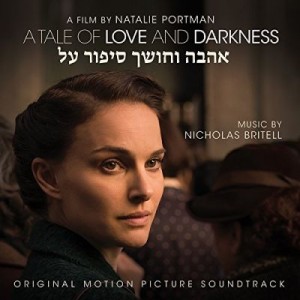
A TALE OF LOVE AND DARKESS soundtrack| ©2016 Milan Records
AX: Another powerful score you’ve done recently is for Natalie Portman’s directorial debut, A TALE OF LOVE AND DARKNESS, based on the memories of the writer Amos Oz, growing up in Jerusalem in the years before Israeli statehood. In the film, Amos’mother falls into a dark depression. What was it like working with Natalie in creating a score that could hit those titular emotions without being too draining and “down?”
BRITELL: It was a truly memorable experience working with Natalie on A TALE OF LOVE AND DARKNESS. Natalie is a dear friend of mine. We actually went to college together, and I was incredibly honored when she asked me to work with her on her film. With regard to the music specifically, I think it was very clear to both of us early on that we wanted the score to be rather restrained because the story is very intense, and we wanted to make sure that the musical approach never felt like it was pushing the emotion too much. With this as our guide, I pursued a variety of textures in some ways inspired by Amos’ family’s love of Western European classical musical traditions and also by their background as coming from Eastern Europe. In addition, their immigrating to Palestine and the formation of the state of Israel provided another layer of potential inspirations. So there was a true variety of musical possibilities; but there was no one region’s approach that I focused on. If anything, I was trying to create a sound that felt like it wasn’t from any one place but was perhaps inspired by these multiple influences. I focused very much on the recording of the instruments in the score, really close miking a lot of the instruments, and focused on enhancing the sound of, for example, the bowing on a viola. In the recordings in A TALE OF LOVE AND DARKNESS, you can actually hear really very clearly the bowing itself, because we wanted there to be this feeling of closeness, at times a feeling of claustrophobia, but above all, we wanted the music to have a sort of intimacy.
AX: You recently re-teamed with Gimme the Loot director Adam Leon for TRAMPS. What can we expect from that score?
BRITELL: Yes, I worked with Adam on GIMME THE LOOT, which was an awesome experience. TRAMPS recently premiered in Toronto and was acquired by Netflix, which we’re very excited about. With “Tramps,” it’s a multi-faceted score: it’s actually a combination of score-like pieces and also songs that I produced for the score. I would describe it as a very wide range of sounds, kind of an eclectic approach where at times the score is wood blocks and sticks and rhythms, and other times it’s electronic landscapes. It’s a very interesting, fun score, which Adam and I really enjoyed working on together.
AX: Given how you’ve often taken an avant-garde approach to scoring, do you see yourself and such rising composers as Mica Levi (UNDER THE SKIN) and Jay Wadley (INDIGNATION) as a new wave of musicians who are bringing a modern concert-hall approach to scoring?
BRITELL: For me, the way that I think about it, and the approach I take, is really determined by the film itself. The key is discovering a unique sound for a film. Sometimes it could be creating something which feels like a concert-hall, perhaps, more avant-garde approach. But other times it might just be discovering something unexpected musically, which really feels like it works with the picture. It’s about the film and what music resonates most strongly to the essence of that film. And overall it’s really about working with the director to discover that sound. I’m certainly drawn at times to nontraditional ensembles and arrangements because I find they often can create unexpected atmospheres and emotional responses. It’s also just really fascinating to try new combinations of instruments and to uncover colors that you hadn’t experienced before.
Nicholas Britell’s score for MOONLIGHT shines on October 21, with Nicholas Brittel’s sore available on from Lakeshore Records on iTunes October 21st, and then on CD November 18th HERE
Listen to Brittel fight The Confederacy within the “Free State of Jones” HERE, then take “The Big Short” HERE
Hear Nicholas tell Natalie Portman “A Tale of Love and Darkness” HERE
Visit Nicholas Brittel’s web site HERE
AGREE? DISAGREE? LET YOUR VOICE BE HEARD IN THE COMMENTS!
Follow us on Twitter at ASSIGNMENT X
Like us on Facebook at ASSIGNMENT X
Article Source: Assignment X
Article: Interview with MOONLIGHT composer Nicholas Brittel
Related Posts:









